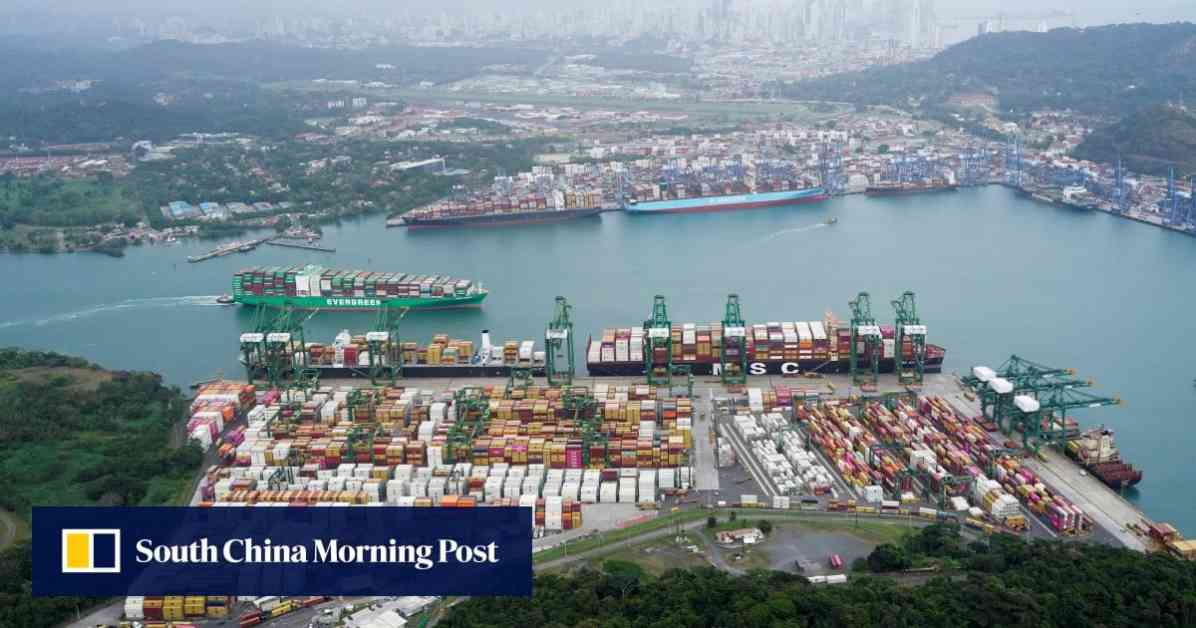CK Hutchison Holdings has recently made headlines with its decision to sell control of a unit operating ports near the Panama Canal, following pressure from US President Donald Trump. The announcement was made on Tuesday, revealing that a consortium consisting of BlackRock, Global Infrastructure Partners, and Terminal Investment Ltd has reached a preliminary deal to acquire units holding 80% of the Hutchison Ports group, valued at approximately US$20 billion (HK$155 billion).
In addition to this acquisition, the consortium will also take over 90% of Panama Ports, which oversees the operation of two ports in Balboa and Cristobal. This deal will also include CK Hutchison’s controlling interest in 43 other ports spread across 23 countries. The sale marks a significant shift in the ownership of key ports near the Panama Canal, a crucial trade route connecting the Atlantic and Pacific Oceans.
The Panama Canal has been at the center of a political debate sparked by President Trump’s remarks claiming that China has control over the waterway. This controversy gained momentum when Trump made these statements during his inauguration speech in January, raising concerns about the strategic importance of the canal for global trade.
Historical Context and Ownership Transition
The Panama Canal, originally funded and controlled by the United States in the early 20th century, underwent a significant transition in 1999 when Panama’s government took over control following an agreement with the US government. This transfer of ownership marked a pivotal moment in the history of the canal, shifting the control from American authorities to Panamanian governance.
Despite this historical handover, recent statements from President Trump and US Secretary of State Marco Rubio have reignited discussions about who holds power over the Panama Canal. During a visit to Panama last month, Secretary of State Rubio echoed President Trump’s sentiments, emphasizing the need for the US to regain control of this critical trade route.
Experts in the field of international trade and geopolitics have raised concerns about the implications of these statements on global commerce and diplomatic relations. The sale of control of ports near the Panama Canal to a consortium involving BlackRock, Global Infrastructure Partners, and Terminal Investment Ltd adds another layer of complexity to this evolving narrative.
Implications for Global Trade and Diplomacy
The decision by CK Hutchison Holdings to divest its stake in key port operations near the Panama Canal has far-reaching implications for global trade and diplomatic relations. As one of the busiest and most strategically significant waterways in the world, the Panama Canal plays a vital role in facilitating the movement of goods between major economic regions.
With the potential shift in ownership to a consortium led by prominent investment firms, there are concerns about how this change will impact the operations and governance of these critical ports. The involvement of BlackRock, Global Infrastructure Partners, and Terminal Investment Ltd in this deal underscores the complex interplay between private investment, geopolitical interests, and global trade dynamics.
As the sale of control of ports near the Panama Canal unfolds, stakeholders across various sectors will be closely monitoring the developments and assessing the implications for their respective industries. The evolving landscape of international trade and maritime infrastructure underscores the interconnected nature of global commerce and the importance of strategic investments in key transportation hubs like the Panama Canal.
In conclusion, the sale of CK Hutchison’s stake in port operations near the Panama Canal represents a significant shift in ownership that has broader implications for global trade, diplomacy, and strategic interests. The involvement of a consortium comprising BlackRock, Global Infrastructure Partners, and Terminal Investment Ltd highlights the intricate web of relationships that shape the modern maritime industry. As the story continues to unfold, the world watches with keen interest to see how this transition will impact the future of one of the world’s most critical trade routes.



























